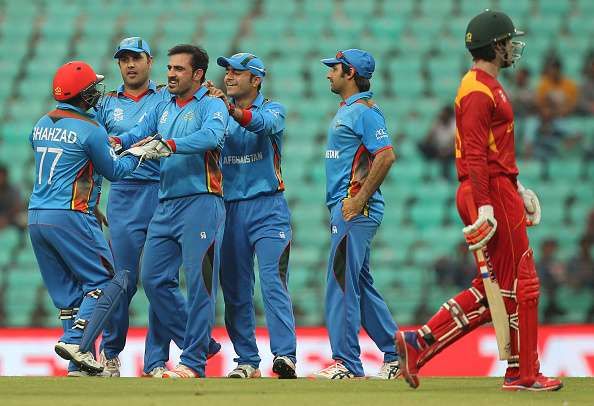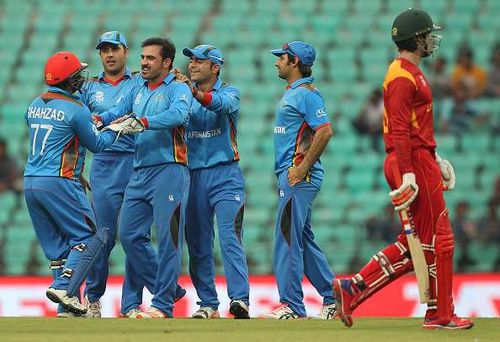
ICC must give top associate teams a proper foothold in the game

Afghanistan clinched their place in the Super Ten stage of the ongoing ICC World T20 tournament with an emphatic win over test side Zimbabwe. The overall display from the war-torn nation was so complete that it would have definitely made South Africa, Sri Lanka, England and WI sit up and take notice.
They will know that their games against Afghanistan will be anything but a walkover. This qualification into the Super Ten to play with big boys of world cricket is no doubt a huge achievement, but to those who have followed the Afghanistan side closely since the 2014 Asia Cup, this should not come as a surprise.
Afghanistan have done well wherever and whenever they have played. They qualified for the 2014 Asia Cup, the 2014 World T20, the 2015 ICC World Cup. In the Asia Cup qualification they had an off day against UAE and given the tightrope walk that the qualification process for these events are, that one off day cost Afghanistan a place in the Asia Cup.
However, Afghanistan have more than made up for that disappointment by now getting into the World T20 Super Ten. In the two years of exposure, that Afghanistan have had to International Cricket, Afghanistan have been by far the most consistent Associate Cricket Nation.
This consistency extends to beyond just the Associate pool, and they have regularly taken on and beaten the test playing sides too. They beat Bangladesh in the Asia Cup 2014, and in the past year they have played 2 ODI and 2 T20I series against test side Zimbabwe and have won all of them. Such has been Afghanistan's consistency that they are ranked higher than both Afghanistan and Bangladesh in the ICC T20 Rankings.
One would think that there must be a some kind of a tangible reward for Afghanistan for this consistency, but there isn't. Afghanistan will have to continue to live hand to mouth, and keep having to qualify for big tournaments as they come along?
World Cricket cannot continue to work in a system where merit has no value. Earlier in the year Bangladesh who are ranked lower than Afghanistan in the T20 table got a free pass into the Asia Cup (where they went on to finish runners-up) while Afghanistan had to qualify for the event. How is this system justified?
In the World T20, Bangladesh and Zimbabwe both got direct entries into the ongoing group stages, but Afghanistan ranked higher on the T20 table than both Bangladesh and Afghanistan had to earn their spot in a qualification round held in Scotland and Ireland last year.
ICC needs to have a hard look at itself and how it treats the associate nations, as it seems performances and ranking seems to have no value at all.
Just as ICC has a pool of Test Teams, who don't lose their test status after a run of poor results, which can extend up to a decade at times (Bangladesh and Zimbabwe), ICC must develop ODI and T20 pools and include the associates who have been consistent over a large period of time.
If Zimbabwe get invited to play all major ODI and T20 events, then there is no reason why Afghanistan and Ireland should not get the same treatment.
Ireland have been a very consistent side too, and have regularly qualified for global tournaments. No one can forget their win over Pakistan in the 2007 World Cup or the spectacular chase to beat England in the 2011 edition.
They also beat WI in the 2015 World Cup. Incidentally both Afghanistan and Ireland are ranked above Zimbabwe in the ODI table. However just like Afghanistan, Ireland don't have anything substantial to show for this consistency. They have no guarantees from ICC of playing global tournaments, which teams ranked below them like Zimbabwe and Bangladesh do.
Ireland and Afghanistan keep having to qualify for events that Bangladesh and Zimbabwe get free passes to. Is it really so hard for ICC to extend the ODI and T20 team pool to include the consistent performers like Ireland and Afghanistan.
In this ODI and T20 pool all teams would be treated on par and if Bangladesh and Zimbabwe get a free pass into a global tournament then so would Afghanistan and Ireland. This gives Ireland and Afghanistan a stable position in the cricket world, which can be used as a springboard for further development.
Asking teams like Afghanistan and Ireland to effectively live hand to mouth, and continuously play qualifiers, without any stable status is fraught with dangers.
In the 1999 World Cup Bangladesh beat Pakistan and were immediately granted test status. However, it seemed the decision had backfired as Bangladesh struggled in the early stages and ICC came in for a lot of criticism for having granted Bangladesh test status too early. Bangladesh struggled for a very long period in cricket.
Around the period that Bangladesh had been granted test status, Kenya were the top associate nation. They qualified for the 1996 World Cup, and beat WI in the tournament. They qualified again for the 1999 world cup, and in the 2003 World Cup shocked everyone by reaching the semi-finals.
If any team deserved test status it was Kenya but ICC never granted it. The fact that the move to grant Bangladesh test status had come in for so much criticism perhaps deterred ICC from granting test status to Kenya, and this proved to be a disastrous decision for the future of Kenyan cricket.
Even though Bangladesh were losing and losing for a long while, by way of test status had found a foothold within the game, and were no long effectively daily wage workers. They used that foothold as a base and were able to bring though the next generation of cricketers. Just look at how far Bangladesh have come today.
Kenya never got any foothold in cricket, and had to live like daily wage workers. They got to play tournaments only if they qualified, and sooner or later any side will fail to qualify, especially when the qualification process allows no room for error.
Just where are Kenya today on the cricket map? Nowhere. If this doesn't drive home the importance of giving good associate teams a foothold within the game nothing will.
Give them more chance
The associate teams live on a tournament by tournament basis, and for associate teams, global tournaments are their oxygen. If they miss playing in one World Cup, its like cutting off their oxygen supply, and as the Kenya example showed, it can be fatal.
Sadly as the present structure stands, instead of ensuring easy accessibility to this oxygen for the top associate sides so they continue to develop, ICC forces these sides to have to walk qualification tightropes to get to this oxygen. ICC must learn from the mistake it made with Kenya and grant a strong foothold for the stronger Associate Nations like Afghanistan and Ireland.
If granting them test status is too much, then at least, grant them ODI and T20 status on par with the likes of Zimbabwe, so that Afghanistan and Ireland do not run the risk of missing out on their oxygen, and keep playing the big tournaments.
This will help them continue to grow steadily and ensure they don't fall down the same route as Kenya. Even if the early growth is slow, ICC must remember how long it took for Bangladesh to finally become competitive.
Cricket is desperately in need of teams who can compete with the test sides, and Afghanistan and Ireland are two sides who have done that. ICC must do its utmost to ensure that these sides go on to even greater heights, and not fall by the wayside like Kenya.
The only way to do that is to give them a foothold like ICC gave Bangladesh and stick with them even if the development seems slow.